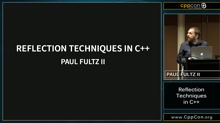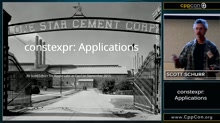Cppcheck-1.75 has been released--Daniel Marjamäki
A new version is here!
Cppcheck-1.75 has been released
by Daniel Marjamäki
From the article:
General changes:
- Replaced internal preprocessor by the brand-new preprocessor 'simplecpp'
- Improved Windows installer: Install a copy of the license instead of asking to accept it
- The Windows x64 binaries are now compiled with profile guided optimization, resulting in a speedup of 11%
- Improved manual, especially the chapter about Libraries
- Improved CWE mapping
- --append is deprecated and will be removed in 1.80...

 ACCU’s Overload journal of August 2016 is out. It contains the following C++ related articles.
ACCU’s Overload journal of August 2016 is out. It contains the following C++ related articles. Have you registered for CppCon 2016 in September? Don’t delay –
Have you registered for CppCon 2016 in September? Don’t delay –  Have you registered for CppCon 2016 in September? Don’t delay –
Have you registered for CppCon 2016 in September? Don’t delay –